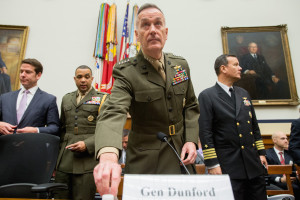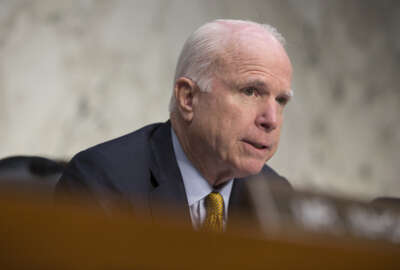
Dunford plans to trim Joint Staff workforce after New Year
Gen. Joseph Dunford, the chairman of the Joint Chiefs of Staff, says he plans to begin divesting the Joint Staff of some of its current responsibilities after t...
Gen. Joseph Dunford, the new chairman of the Joint Chiefs of Staff, said he intends to do his part to respond to congressional criticism over ballooning bureaucracies within the Defense Department and will begin pruning the operations of the military’s sprawling Joint Staff within the next few weeks.

Dunford hasn’t specified which of the Joint Staff’s functions he thinks DoD can do without or how many positions might be eliminated, but has made clear that he believes some elements of the organization he now oversees overlap with similar work already being done in the Office of the Secretary of Defense and in the military services.
“I want to do this right. We’ll probably do this sometime after the first of the year when I can actually look people in the eye and say, ‘Listen, you’re doing a great job — it’s not about you — but we’re going to divest ourselves of these functions,’” Dunford told a conference hosted by the Center for a New American Security. “Over time, for a variety of reasons, the Joint Staff has begun to do things that I think we can probably walk away from. My priority is going to be to focus on strategy and supporting the combatant commander. That means force development, capability development, joint force readiness, those core areas.”
Dunford said the changes will mean that the Joint Chiefs, as an institution, will pay less attention than in years past to policy matters that are better left to OSD and the military departments, including the gritty details of how the individual military services handle training, recruitment and personnel issues.
He said the current size of the staff — about 4,000 military members and civilians — is driven by the perceived need for the chiefs to weigh in with one voice on all matters affecting the military, which, in turn, demands large numbers of internal analysts with expertise on a much wider range of issues than the ones Dunford believes are the Joint Chiefs’ core functions.
“Since I became chairman, we have not had a meeting of the Joint Chiefs on what I would describe as a Title 10 issue, and I don’t intend on doing that except in very extraordinary cases,” he said. “I’ll give you an example: the pay raise. I talked to the chiefs and said, ‘Look, if you all think we need a Joint Chiefs position on the pay raise, that’s fine, but you already have a vehicle to provide your input through your service secretary which then goes to the secretary of Defense.’ So unless there’s an extraordinary reason for discussing those issues, we won’t have Joint Chiefs positions. In my mind, we need to spend our time establishing positions on the current fight against ISIL, what our way ahead ought to be in Afghanistan, what our strategy ought to be in dealing with some of the many other strategic challenges we face.”
About half of the current Joint Staff workforce is made up of service members and civilian positions which were were absorbed into the organization in 2011, when the military closed its Joint Forces Command in Suffolk, Virginia and moved about 2,000 out of JFCOM’s 2,300 government positions into the Joint Staff.
Critics, including Sen. John McCain (R-Ariz.), the chairman of the Senate Armed Services Committee, have seized on that example as emblematic of the fact that DoD never seems to actually downsize its headquarters staffs even while it’s shrinking its operating forces; it simply moves the positions to other organizations.
During recent hearings McCain has hosted in the run-up to potential DoD reform legislation, several defense experts have singled out similar “bloat” in the military’s combatant commands, and pointed out that most modern military operations are now overseen by single-purpose Joint Task Forces, not the COCOMs.
But Dunford said he would urge caution before diminishing the combatant commands’ role.
“We need to be careful about any discussion that says the COCOMs aren’t warfighters. I’m willing to take a hard look at this, wargame it, and be critical in our thinking about it, but I don’t want us to take the last 14 years of war — where joint task forces make sense against a group like ISIL — and then project that out to what we’ll need for the next 15 or 20 years,” he said. “We need to talk about what the combatant commanders do or don’t do. … That doesn’t mean we can’t make some changes in our Unified Command Plan. It doesn’t mean all the combatant commands have to exist in their current form. It doesn’t mean the Joint Staff has to exist in its current form. I just want to make sure that we have the right framework within which to make recommendations and to have a debate.”
And Dunford said he’s not philosophically opposed to shrinking the staff size of any military organization. Bigger, he said, does not equal better.
Related Stories
“I’m still growing into the staff that I now have,” he said. “I was much happier as a colonel when I actually knew everybody on my staff. You have a personal relationship with them and you can move at the speed of heat. When you have a larger staff, it’s much more difficult to convey your intent. It’s much more difficult to come up with a process within which you can frame decisions and make decisions.”
Dunford said he believes most senior military leaders would opt for smaller staffs if they were offered the option.
“It’s just got to be aligned to the functions that have to be performed, and that’s the work that we have to do really pretty quickly because Senator McCain’s running pretty hard,” he said. “I think I have an obligation to provide best military advice and inform that dialogue. The department’s position on reform wasn’t accepted at the time of Goldwater-Nichols, but I’d like to think that right now that we’re willing to be as innovative as anybody else is. I’m not fighting to hang onto what we have today, I just want to make sure that we spend 80 percent of our time trying to solve strategic problems for tomorrow and 20 percent of our time developing the wire diagram and talking about how big we ought to be. That would be my only appeal in this debate.”
Copyright © 2024 Federal News Network. All rights reserved. This website is not intended for users located within the European Economic Area.
Jared Serbu is deputy editor of Federal News Network and reports on the Defense Department’s contracting, legislative, workforce and IT issues.
Follow @jserbuWFED




